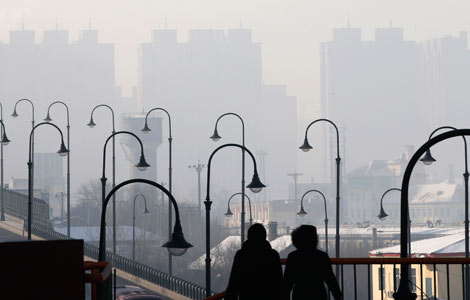Arson attack will not harm ties
Updated: 2014-01-08 08:15
By Wang Hui (China Daily USA)
|
||||||||
When the US Federal Bureau of Investigation announced on Monday that a man suspected of carrying out the arson attack on the Chinese consulate in San Francisco, California, had been arrested, those who want relations between the United States and China to go well must have sighed in relief.
According to Special Agent David Johnson, chief of the FBI's San Francisco office, a 39-year-old man, who has permanent resident status of the United States, was arrested on Friday after he turned himself in by calling police in Daly City, some 16 kilometers south of San Francisco.
Considering relations between China and the United States have been improving and go far beyond the bilateral scope, any delay in cracking the case could have cast a shadow on the good momentum that has been nurtured by the leaders of both countries and led to unhealthy international speculation on the trajectory of their interaction this year.
Obviously, such a scenario is the last thing both countries want to see, as 2014 will be a significant year for them to substantiate their commitments to building a new type of relationship between an established power and an emerging one. The blaze ignited on the New Year's Day, which coincided with the establishment of formal diplomatic relations between the two countries 35 years ago, should serve as a reminder to both sides that there is still a long way to go in the recalibration of their ties.
At the moment, the US needs to properly handle the aftermath of the arson case. The weight of bilateral ties and norms governing international relations, the Vienna Convention on Diplomatic Relations in particular, demand that the US take effective measures to protect foreign diplomatic institutions and staff on its soil. Washington has an unshirkable responsibility to prevent similar incidents from happening again, and to bring the perpetrator of the latest arson attack to justice at an early date.
It is expected both Beijing and Washington will take substantial steps in deepening strategic mutual trust this year, which is an important part of building a new type of relations between major powers, and they should step up their coordination to deal with emergencies and enhance crisis management so that the repercussions of any incidents, such as the arson attack on the San Francisco consulate, can be kept to a minimum.
True, it is widely perceived that Beijing and Washington have demonstrated both political will and skills in stepping up crisis management in recent years. However, under the backdrop that the US is implementing its rebalancing strategy to the Asia Pacific and that China's overseas interests are growing, whether the two countries can avoid strategic misjudgments is an issue that not only concerns themselves but also the entire world.
In December, a Chinese naval vessel and a US warship narrowly avoided a collision in the South China Sea. Though both governments have kept the incident low key, it drew a lot of attention from the media in the two countries and the rest of the world. This offers further proof of the need to carefully steer their relations so that such incidents do not become flashpoints.
Thanks to 35 years of efforts from both countries, the interdependency of our two countries has reached an unprecedented level. It is in the best interests of our two countries to continue to propel the bilateral trade volume, robust people-to-people ties and significant interaction in other fields.
Yet, as China's Foreign Minister Wang Yi rightfully pointed out in an article commemorating the 35th anniversary of the establishment of China-US diplomatic relations, due to differences in their political systems, level of development, history and cultural traditions, it is only natural for the two countries to have disagreements and differences.
Mutual respect offers the right approach to managing our differences, Wang recommended. Indeed, any friction will appear to be less formidable as long as our two countries can trust each other and join hands to find a best solution to them. In this regard, the US should have a correct understanding of China's strategic intentions. China has no intention of challenging the US' interests either in the Asia Pacific or elsewhere. In return, the US should show due respect to China's major concerns either in the region or beyond.
The author is a senior writer with China Daily.
wanghui@chinadaily.com.cn
(China Daily USA 01/08/2014 page12)

 US skiing star Lindsey Vonn out of Sochi Olympics
US skiing star Lindsey Vonn out of Sochi Olympics
 Check out cool new gadgets from CES 2014
Check out cool new gadgets from CES 2014
 Cold snap sweeps US
Cold snap sweeps US
 Pollution's effect on health not clear yet, officials say
Pollution's effect on health not clear yet, officials say
 Russia imposes security clampdown in Sochi before Olympics
Russia imposes security clampdown in Sochi before Olympics
 X-ray reveals crying toddler had 5-cm needle inserted in his lung
X-ray reveals crying toddler had 5-cm needle inserted in his lung
 Tokyo urged to end militarism
Tokyo urged to end militarism
 Military drill in SW China
Military drill in SW China
Most Viewed
Editor's Picks

|

|

|

|

|

|
Today's Top News
Syria chemical weapons shipped out
US jobless bill clears Senate hurdle
Former Miss Venezuela shot dead
Microsoft close to naming CEO
US-China trade deficit narrows, again
Staying ahead of the game
Odierno: US, China to work on issues
China is importing more US-built cars
US Weekly

|

|






